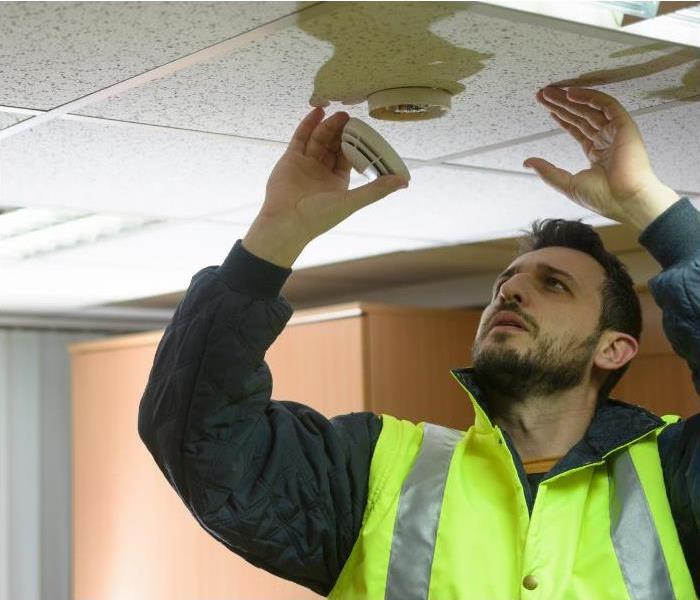Tips to Protect Your Home from Fire Damage in Salt Lake City, UT
7/19/2024 (Permalink)
Living in Salt Lake City offers a picturesque view of the Wasatch Mountains and a vibrant urban life. However, with its unique climate and landscape, homeowners in this area must be particularly vigilant about fire safety. Protecting your home from fire damage is crucial to ensuring the safety of your family and property. Here are some essential tips to safeguard your home from the threat of fire.
1. Install Smoke Alarms
Smoke alarms are your first line of defense against fires. They provide early warning, allowing you and your family to evacuate safely and call for help. Here are some key points to consider:
Install smoke alarms on every level of your home: Place them inside bedrooms and outside sleeping areas to ensure you hear the alarm even if you’re asleep.
Test alarms monthly: Regularly check that your smoke alarms are functioning correctly. Replace batteries at least once a year, and consider using alarms with a long-life lithium battery.
Replace alarms every 10 years: Smoke alarms lose their sensitivity over time. Ensure your alarms are up-to-date to maintain optimal protection.
2. Create and Practice a Fire Escape Plan
In the event of a fire, every second counts. Having a well-rehearsed fire escape plan can save lives:
Develop a clear plan: Outline two escape routes from each room and establish a meeting point outside the home.
Practice regularly: Conduct fire drills with your family at least twice a year to ensure everyone knows the plan.
Teach children how to escape: Make sure children understand the plan and know how to respond if they hear the smoke alarm.
3. Maintain Your Electrical System
Faulty electrical systems are a common cause of house fires. Regular maintenance and safe practices can prevent electrical fires:
Inspect wiring: Have a licensed electrician inspect your home’s wiring periodically, especially if your home is older.
Avoid overloading outlets: Plugging too many devices into a single outlet can cause overheating and fires. Use power strips with surge protectors and avoid daisy-chaining extension cords.
Unplug unused appliances: Unplugging appliances when they’re not in use can prevent overheating and potential fires.
4. Be Cautious with Heating Equipment
Salt Lake City winters can be cold, necessitating the use of heating equipment. However, heaters and fireplaces can be fire hazards if not used properly:
Keep flammable objects away: Maintain a safe distance between heating equipment and flammable materials like furniture, curtains, and paper.
Inspect and clean chimneys: Have your chimney inspected and cleaned annually to prevent creosote buildup, which can ignite and cause a fire.
Use space heaters safely: Follow manufacturer instructions, keep them on a stable surface, and turn them off before leaving the room or going to bed.
5. Cook with Care
The kitchen is a common area for house fires to start. Practicing safe cooking habits can significantly reduce this risk:
Never leave cooking unattended: Stay in the kitchen while you’re cooking, especially when using high heat or frying.
Keep flammable objects away from the stove: Ensure dish towels, paper towels, and other flammable items are kept away from the stovetop.
Install a fire extinguisher: Keep a multi-purpose fire extinguisher in the kitchen and ensure you know how to use it.
6. Practice Safe Smoking Habits
Smoking is a leading cause of house fires. If you smoke, follow these guidelines to reduce the risk:
Smoke outside: Avoid smoking indoors to prevent accidental fires.
Use deep, sturdy ashtrays: Ensure cigarettes are fully extinguished by using appropriate ashtrays.
Never smoke in bed: Falling asleep while smoking is extremely dangerous and can easily lead to a fire.
7. Store Flammable Materials Safely
Many common household items are flammable and need to be stored safely to prevent fires:
Keep flammable liquids in a cool, dry place: Store gasoline, paint, and other flammable liquids away from heat sources and in proper containers.
Limit the use of candles: Use battery-operated candles instead of open-flame candles, especially if you have pets or small children.
Properly dispose of oily rags: Oily rags can spontaneously combust. Store them in a metal container with a tight lid and dispose of them properly.
8. Use Fire-Resistant Building Materials
If you’re building or renovating your home, consider using fire-resistant materials to enhance your home’s safety:
Fire-resistant roofing: Choose roofing materials such as metal, tile, or asphalt shingles that are designed to resist fire.
Fire-rated doors and windows: Install fire-rated doors and windows to slow the spread of fire and provide additional escape time.
Non-combustible siding: Materials like brick, stucco, or fiber-cement siding can help prevent fires from spreading to your home.
9. Create a Defensible Space
Creating a defensible space around your home can reduce the risk of fire spreading to your property:
Clear vegetation: Remove dead plants, leaves, and other flammable materials from around your home.
Maintain landscaping: Keep trees and shrubs well-trimmed and away from your house.
Use fire-resistant plants: Consider landscaping with fire-resistant plants and materials.
10. Stay Informed and Prepared
Staying informed about fire risks and being prepared can make all the difference:
Monitor weather conditions: Be aware of high fire danger days and take extra precautions during these times.
Keep emergency contacts handy: Have a list of emergency contacts, including local fire departments and neighbors, readily available.
Prepare an emergency kit: Keep an emergency kit with essentials like water, food, medications, and important documents in case you need to evacuate.
Protecting your home from fire damage in Salt Lake City requires vigilance and proactive measures. By installing smoke alarms, creating a fire escape plan, maintaining your electrical and heating systems, practicing safe cooking and smoking habits, storing flammable materials safely, using fire-resistant building materials, creating a defensible space, and staying informed, you can significantly reduce the risk of fire. Taking these steps not only safeguards your property but also ensures the safety and well-being of your loved ones.

 24/7 Emergency Service
24/7 Emergency Service
